
Iran and Two Wars
The editorial of Jahan Sanat argues that the Iranian people do not want to get involved in the wars in Ukraine and Gaza.
Today there are two catastrophic wars in the world: first is the Russia-Ukraine war which has been waged by Russia’s despotic leader Vladimir Putin and has been going on for more than 500 days without Russia achieving its goals. On the other hand, it is almost 40 days into the terrible war in Gaza which has been underway with Israel’s extensive war on the Gaza Strip after Hamas’ ambush attack on Israel.
It is notable that the US political system has created a significant role for itself and has de facto become an actor in both wars. In both the Russia-Ukraine war and the Hamas-Israel war, of course, the Americans play the logistical role of backing Ukraine and Israel and there is no sign of an active presence of the US army and military forces in these wars.
On the other hand, since being anti-America is one of the fundamental pillars of Iran’s foreign policy, Iran’s senior political officials are rooting for Russia and Hamas to win the wars against, respectively, Ukraine and Israel.
Iranian officials’ explicit support for Hamas as well as Iran’s relations with certain regional factions and groups have paved the way for multiple reports regarding the Iranian government’s role in these two wars which is so true of the Hamas-Israel war.
Iranian Foreign Minister Hossein Amir-Abdollahian, ever since the breakout of the war in Gaza, has repeatedly visited different countries to inform these countries of Iran’s foreign policy objectives. In compliance with his duties, he sometimes has to make sensitive remarks. For instance, he recently said that the conditions of the war in Gaza are such that it might spread to the region. Such remarks, along with recent attacks by US forces in Syria, have caused concern among the Iranian people.
Those Iranians who love their land hope that Iran’s foreign policy is designed so that there is no need for the inevitable spread of the war. It is a matter of fact that any conflagration in West Asia would be damaging for Iran’s economy which is already suffering and for the entire country.
Iranians do not approve of the way Israel is treating Palestinian citizens, particularly the civilians, and nor do they condone Russia’s treatment toward an independent country. But, on the other hand, they do not believe that Iran should get involved in any of these two wars.
Necessity of Ceasefire in Gaza
The editorial of Arman Melli argues for a ceasefire in Gaza, underscoring that even a temporary ceasefire agreement might lead to a permanent one.
There is controversy in the Western media while public opinion in the West is against what is happening in the Gaza Strip and everyone is pushing for a ceasefire there. That is because the “Zionist regime” is committing genocide against Gazans. But the Western media and arrogant countries fear that the public rage may become widespread and turn into an essential problem for these countries.
So to escape this problem, they are after a kind of maneuver in the media in the name of a ceasefire. But in practice, we are witnessing the continuation of an unprecedented genocide by Zionists.
Of course, the Zionist regime is at a dead end because, on the one hand, it is facing public anger and, on the other hand, there is domestic rage and resentment because Zionist society is unsafe, businesses are closed, and this has become intolerable for them. The Zionist regime, therefore, tries to play a kind of game to escape these pressures.
But it seems that eventually the Zionist regime will have to stop the war, particularly given the extraordinary summit of the Organization of Islamic Cooperation (OIC) in which there was a call for an immediate ceasefire and humanitarian aid for Gaza.
At the end of the OIC’s summit, a powerful statement was issued showing that Arab and Islamic countries cannot remain silent on this issue as these countries’ leaders will then have to face big questions from the public.
Of course, although the Resistance Front is calling for a general ceasefire while the West and Zionists are proposing even a temporary one, it seems that any ceasefire, temporary or permanent, can be very important because during a ceasefire, diplomatic measures will increase behind the scenes and that might result in renewing the ceasefire.
That has two main reasons: first, the pressure of public opinion, and second, the fact that Zionist society cannot continue the war. Under the current circumstances in which the Zionist regime has not achieved a decisive victory and has suffered heavy losses, a temporary ceasefire deal can then turn into a permanent deal.
If humanitarian aid reaches Gaza and a ceasefire – even a temporary one – is secured, then the political actors can work behind the scenes to extend the ceasefire deal.
Israel’s Policy for Overcoming the Crisis
The editorial of Arman Emrooz speculates on what the Israeli government is going to do in the Gaza Strip.
Following the Hamas attack, Israel was surprised and suffered a historical defeat. Following that defeat, it launched its attack on Gaza killing more than 11,000 innocent civilians. We must note that the Zionist regime intends to change the Gaza crisis into an anti-crisis: Israel’s plan, with the assistance of the United States and the West, is to violently bomb Gaza, destroy all the city’s infrastructure, and then forcibly move the people of this region to other countries.
After that, the remaining citizens of Gaza will be administered under the management of the Zionist regime, the Palestinian National Authority and the United Nations. What is happening in Gaza reveals this goal of the Zionist regime.
They want to disarm Palestinian fighters and run the city of Gaza under the joint administration of the Palestinian National Authority and the United Nations. That is why the United Nations, the United States and Europe are against any ceasefire in Gaza and killing people is a part of the joint plans of the United States, Europe and the Zionist regime.
Under these circumstances and given the silence of the global community and the UN Security Council’s inability in creating a mechanism for ending the war in Gaza, no good sign seems to be on the horizon.
By securing Gaza, they seem to mean that all economic and social aspects in Gaza are going to be supervised by Israel while the United Nations too will monitor the situation. But what is important for Netanyahu is a big military achievement even at the cost of the lives of millions of people so that the Israeli government can show itself as the victor of Operation Al-Aqsa Storm.
On the other hand, we have witnessed that this plan has opponents and Israel has not been able to persuade the other sides and now they are at a dead end. Today, even the United States is pressuring Israel and everybody knows the differences are growing between them.
Failed United Nations and Necessity of Presence of UN Secretary General in Gaza
The editorial of Ebtekar argues that as the United Nations cannot make Israel stop bombing Gaza, the UN secretary general must go to Gaza himself along with his deputies and representatives of those countries that have called for a humanitarian ceasefire.
Currently, the images of the catastrophe perpetrated by Israel in Gaza have impacted people across the world, while the UN Secretary General has nothing to offer but words and is taking no measures against the genocide committed by Israel. Whenever a draft resolution is proposed for a humanitarian ceasefire in the UN Security Council, it is vetoed by the United States, the UK and France.
As a result of the deadlock in ratifying a resolution by the UN Security Council, Israel keeps massacring women, children and the elderly and continuously bombs Gaza. In half an hour, it has conducted more that 100 air attacks – 99% of which were blind attacks only killing innocent people.
Even if the UN Security Council votes to condemn Israel, it will continue to perpetrate its crimes because of the weakness of the United Nations and the US support for Israel. In the UN General Assembly, 120 countries of 193 countries voted for an immediate humanitarian ceasefire. Although the UN General Assembly’s votes are not binding, the considerable number of votes shows that the world is against the relentless bombing of Gaza, but Israel does not heed this call for a ceasefire and continues its attacks incessantly.
Now, it is useless to expect the failed UN Security Council and General Assembly to have any impact on the war. The best thing for the UN Secretary General to do now is to go to Gaza along with his deputies and members of countries that have called for a ceasefire. As such, they can end Israel’s blind attacks and stop the massacre of innocent civilians including women, children the elderly. Otherwise, issuing statements to condemn Israel will not help stop the bombing and massacring of women, children and the elderly.

Raisi Met With Saudi Crown Prince, Egyptian President in Riyadh
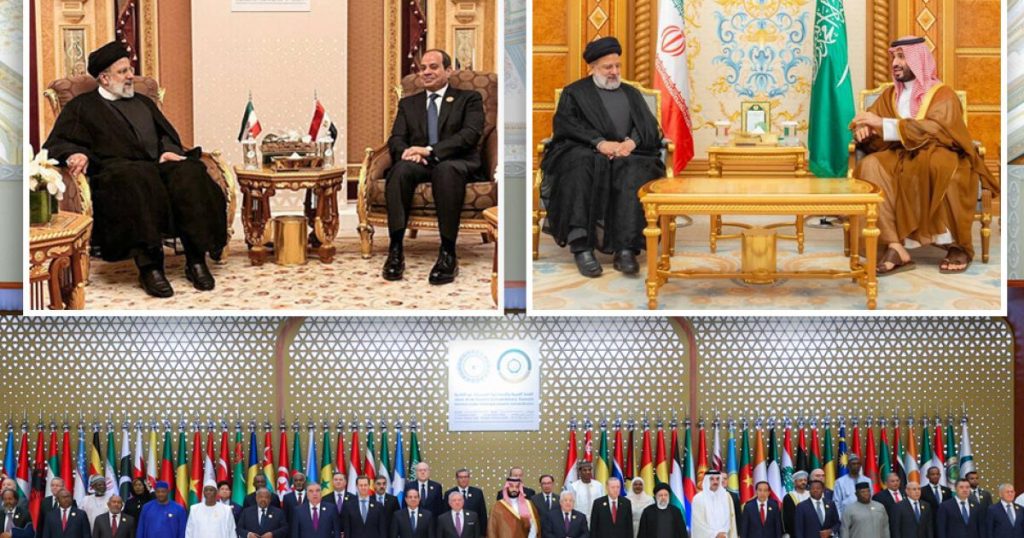
Iranian President Ebrahim Raisi who had gone to Saudi Arabia to take part in an extraordinary summit of leaders of the Organization of Islamic Cooperation (OIC) and had separate meetings with Saudi Crown Prince Mohammed bin Salman and Egyptian President Abdel Fattah el-Sisi.
This was the first official trip of an Iranian president to Saudi Arabia after 11 years, and is considered as a turning point after the restoration of diplomatic relations between Tehran and Riyadh earlier this year.
President Raisi reciprocated the invitation to the Saudi crown prince for visiting Iran.
On Saturday, Saudi Arabia hosted an OIC summit in which the continuation of the Israeli army’s attacks on the Gaza Strip and the provision of humanitarian aid for Gazans were discussed by senior officials of Arab and Islamic countries.
The Israel-Palestine dispute, calling for the formation of an independent Palestinian country and the return of displaced people to their land were the issues that have brought together the positions of Arab and Islamic countries despite all their differences.
Leaders of Arab and Islamic countries, in the final statement of Riyadh’s extraordinary summit, called for the global community to stop exporting arms and ammunitions to Israel.
The statement also calls for stopping the siege of Gaza and sending international aid for those living in the Gaza Strip.
On the sidelines of the summit, Raisi held a historically unprecedented meeting with Egyptian President Sisi.
During his meeting with the Egyptian president, Raisi underscored that the Iranian government sees no obstacles for expanding relations with Cairo.
Tehran and Cairo have had no diplomatic relations for four decades since the 1979 revolution in Iran.
School Textbooks: The New Victims of Gender Segregation in Iran
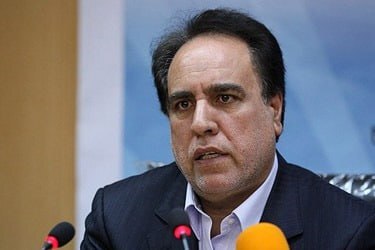
Iran’s education minister has announced that school textbooks must be tailored to students’ gender from now on.
“We should make different textbooks in accordance with the gender of girls and boys while institutionalizing the culture of chastity in the entire society,” stated Reza Morad Sahraei. Lauding the Iranian revolution for changing the role of women in society, he noted women are now both “active and chaste at the same time.”
Sahraei also claimed that the conditions of Iranian schools and students are “much better” than those of other countries but “what the revolution wants from us is far from it.”
The education minister had previously referred to making changes in the content of some 56 textbooks in the new academic year in September.
The changes were included in the agenda by order of Iran’s Supreme Leader Ali Khamenei.
In May, an official in the Ministry of Science, Research And Technology stated that plans for the “reform” of university textbooks were underway with the cooperation of “more than 7,000 academics.” Reza Taghizadeh, who heads the Planning Office at the ministry, mentioned the review of 1,500 courses.
Former Education Minister Yousef Nouri also made an announcement on changing the content of 200 textbooks at schools, remarking “promoting the culture of martyrdom has started at schools and the textbook content would be changed in line with that culture.”
Meanwhile, this recent move has evoked reactions among other officials, one of whom is former Deputy Education Minister Ebrahim Saharkhiz who railed at Sahraei. “Instead of gender segregation, do something about the shortage of teachers, Mr. Minister!” said Saharkhiz, adding that Iranian schools currently lack 300,000 teachers.
Saharkhiz also questioned the entire policy, “How on earth can one make science, math and literature for men only or for women only?”
The mastermind behind this segregation, however, is Khamenei who has repeatedly called for the review and revision of textbooks. In one of his 2022 speeches, he stated, “useless material in textbooks must be removed.”
The significant role of university students and highschoolers in the massive protests of the Woman, Life, Freedom movement, triggered by the killing-in-custody of Mahsa Amini, has once again cast doubt on the educational policies of the Iranian republic, leading to intensifying ideological concerns and the suppression of students.
Rampant Disqualification of Current Lawmakers for Upcoming Elections
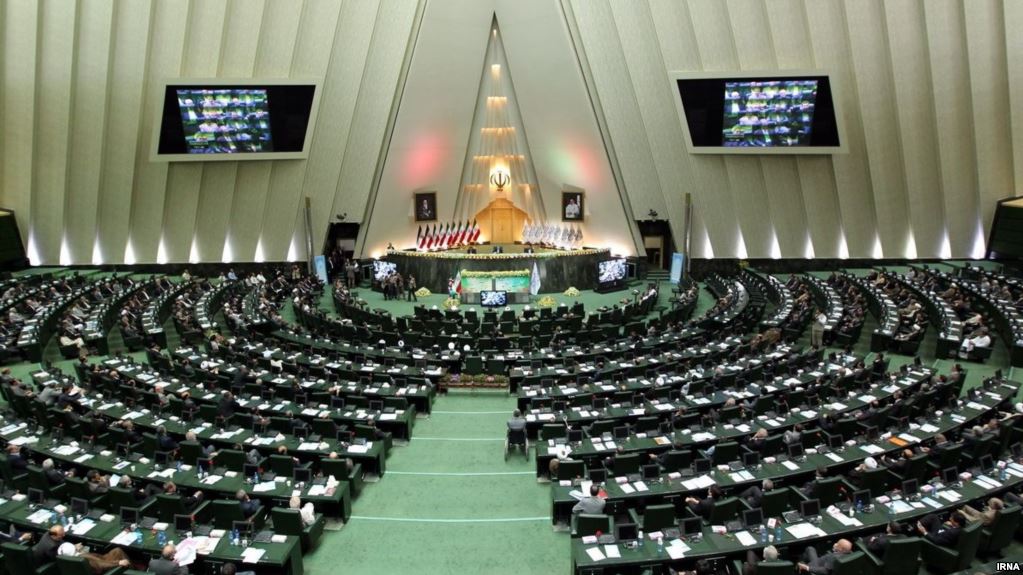
There are reports as to the disqualification of at least 25 current lawmakers from the upcoming parliamentary elections in Iran. Four women lawmakers too are among those disqualified. These lawmakers were disqualified by “executive committees” appointed for the upcoming elections for the Iranian Parliament.
The election executive committees have cited electoral laws and by-laws including “not being committed to the Islamic Republic.”
This law stipulates that the candidates for the parliamentary elections must have a “practical commitment to Islam,” a “practical commitment to the establishment of the Islamic Republic” and “loyalty to the Constitution and the principle of the absolute rule of Wilayat al-Faqih.”
Moreover, some lawmakers, like the city of Abadan’s MP, have stated that they have been disqualified without giving any explanation.
Massoud Pezeshkian, who has been a lawmaker for several terms and even deputy Parliament speaker, and Ahmad Alireza Beigi have announced that they have been disqualified for “lack of commitment to the establishment” and “condemnation for measures against the country’s security.”
Meanwhile, some former lawmakers too have been disqualified including Ali Motahari, Gholamali Jafarzadeh and Hedayat Khadami.
The widespread disqualification of candidates from the parliamentary elections which has included a large number of current and former lawmakers has been deemed as a “purging” of the Parliament. In light of the fact that election executive committees act under the Interior Ministry, Ebrahim Raisi, as head of the government, has been blamed for these disqualifications.
In recent months, different political factions in Iran were trying to convince people to take part in the upcoming elections, but, given the widening gap between people and the government, the public does not seem to care about these political maneuvers. However, it seems that the process of purging the other factions and groups still continues even when Iranian people do not care about the elections.
Iran Claims $1 Billion of Military Exports in 2022
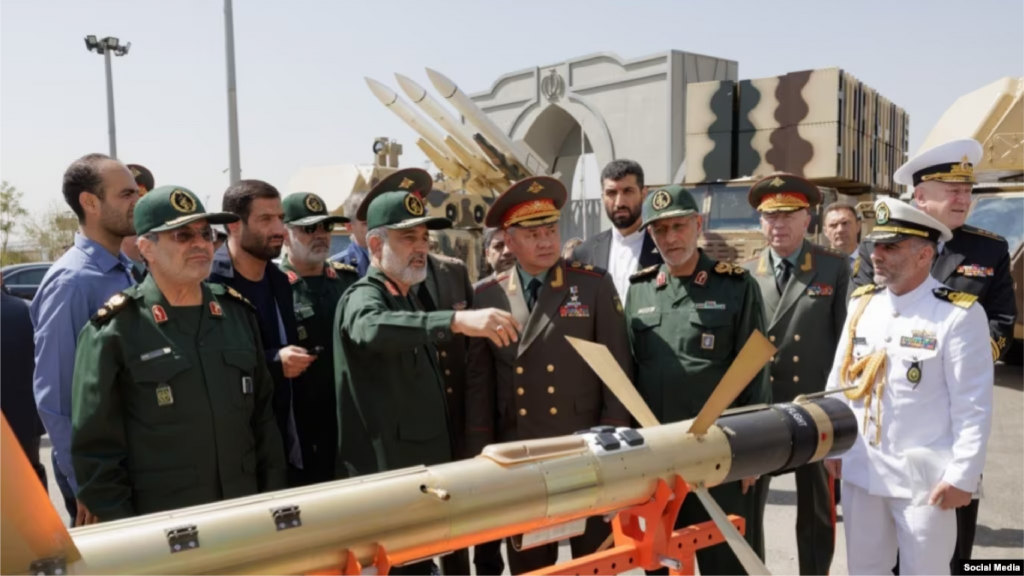
Iran’s Deputy Defense Minister Mehdi Farahi in his speech at Rajaee University in Tehran, asserted that Iran had roughly $1 billion of military exports in 2022.
Without mentioning the details of Iran’s military exports, Farahi stated that the Defense Ministry uses knowledge-based companies, industrial towns, universities and science and technology parks, adding that 7,000 companies and more than 100,000 people work with this ministry.
While this Defense Ministry official announced $1 billion of military exports in 2022, the UN Security Council’s sanctions against Iran’s missile program ended last month in compliance with the nuclear deal. The US administration, however, has stated that with imposing new sanctions, it will heighten efforts for countering Iran’s missile program and drone production.
Earlier, the EU Representative for Foreign Affairs Josep Borrell issued a statement urging that the UK, France and Germany would not intend to remove the sanctions against Iran which were going to expire on October 18.
Given the evidence and reports of Russia’s attacks on Ukraine’s military and civilian structures with Iranian drones, most of Tehran’s military exports must have been to Moscow over the past year and a half.
In many of its attacks against Ukraine, Russia has used drones and the debris of the downed drones prove that Russia is using Iran-made drones in this war.
Iranian officials, nevertheless, have denied the reports of exporting drones to Russia for attacking Ukraine, insisting that a limited number of drones were delivered to Russia before the outbreak of the war.
However, former Foreign Minister Mohammad Javad Zarif recently stated in an interview, with regard to the accusation against the Iranian government for interfering in the Russia-Ukraine war, that “in the issue of Ukraine, Russia duped us. They got the drones and they themselves exposed it.”
Iranian Universities to Give Scholarships to Gazan Girls, Says Raisi’s Deputy
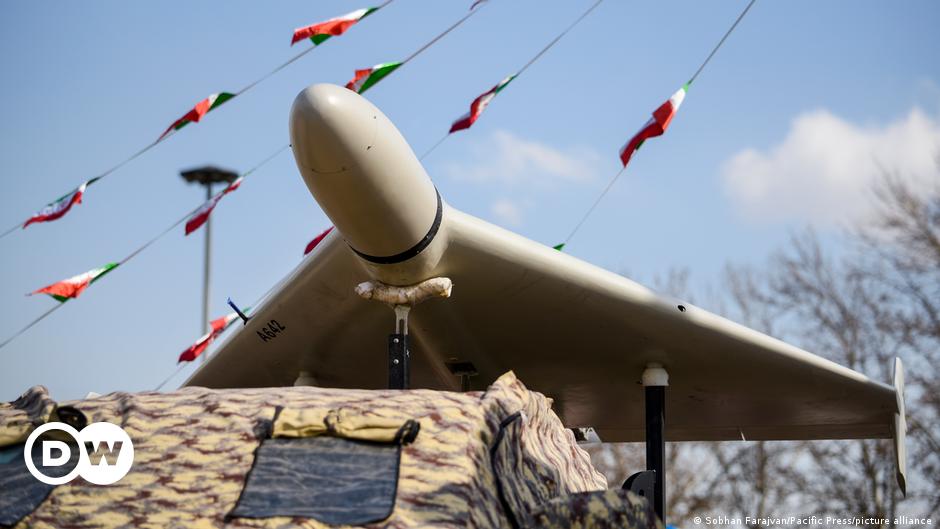
Vice President for Women and Family Affairs Enssieh Khazali announced the Iranian government’s plan to offer scholarships to a number of Gazan girls in Iranian universities.
Meanwhile, Iranian students face many difficulties in meeting their educational expenses.
In her speech in the city of Hamadan at Bu-Ali Sina University, Khazali stated that admitting foreign female students in Iranian universities can be effective in expanding Iranian-Islamic culture to other countries.
Regarding the new scholarship plan, she added that “we will back Gazan girls for studying in Iran, and accordingly, three Gazan students, in a symbolic move, will receive scholarships from Bu-Ali Sina University so that we might then expand this measure in other universities.”
Khazali underscored that admitting foreign female students is for turning them into “envoys of Iranian-Islamic culture.”
Earlier in 2022, the head of Tehran University announced a plan for admitting Hashd al-Sha’abi members in this university.
Iranian officials’ measures for admitting members of Hashd al-Sha’abi in Tehran University and similar plans are for backing the Iranian establishment’s proxy groups, and similar opportunities have been previously provided for similar groups in Yemen, Syria, Lebanon, Nigeria and other countries.
